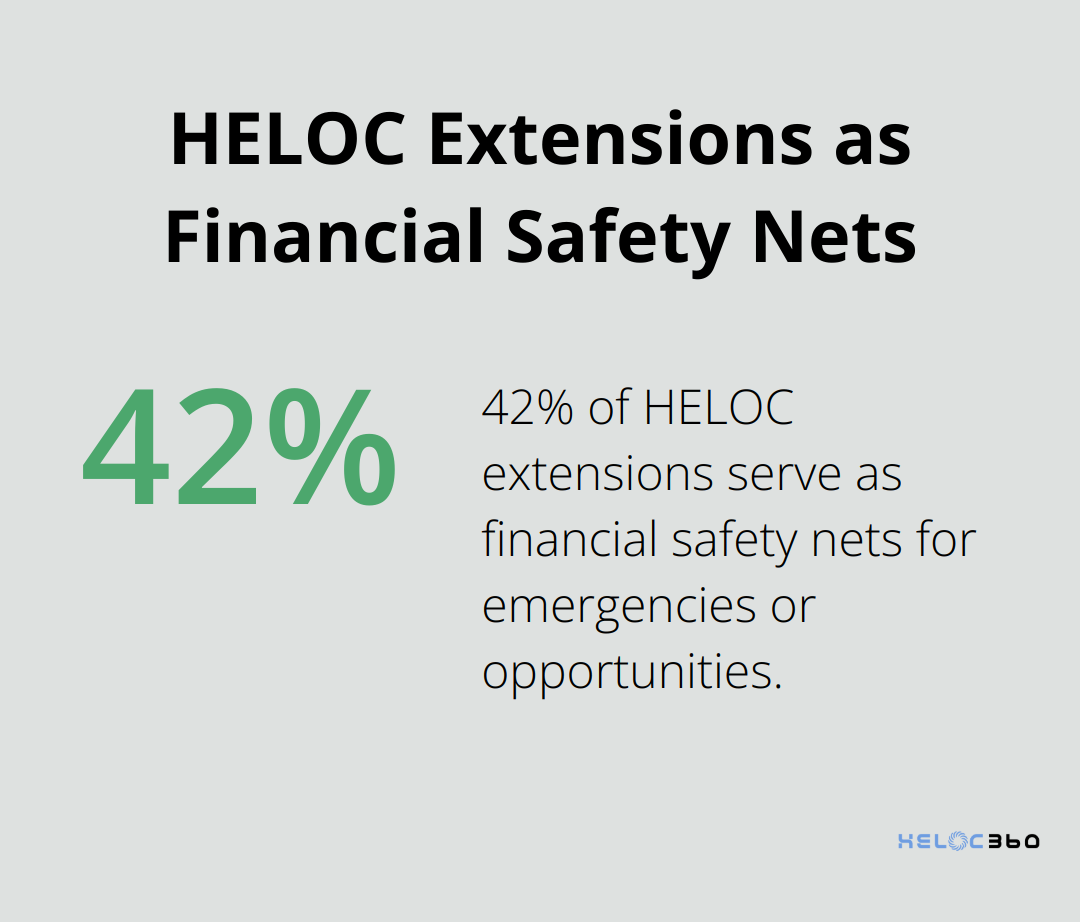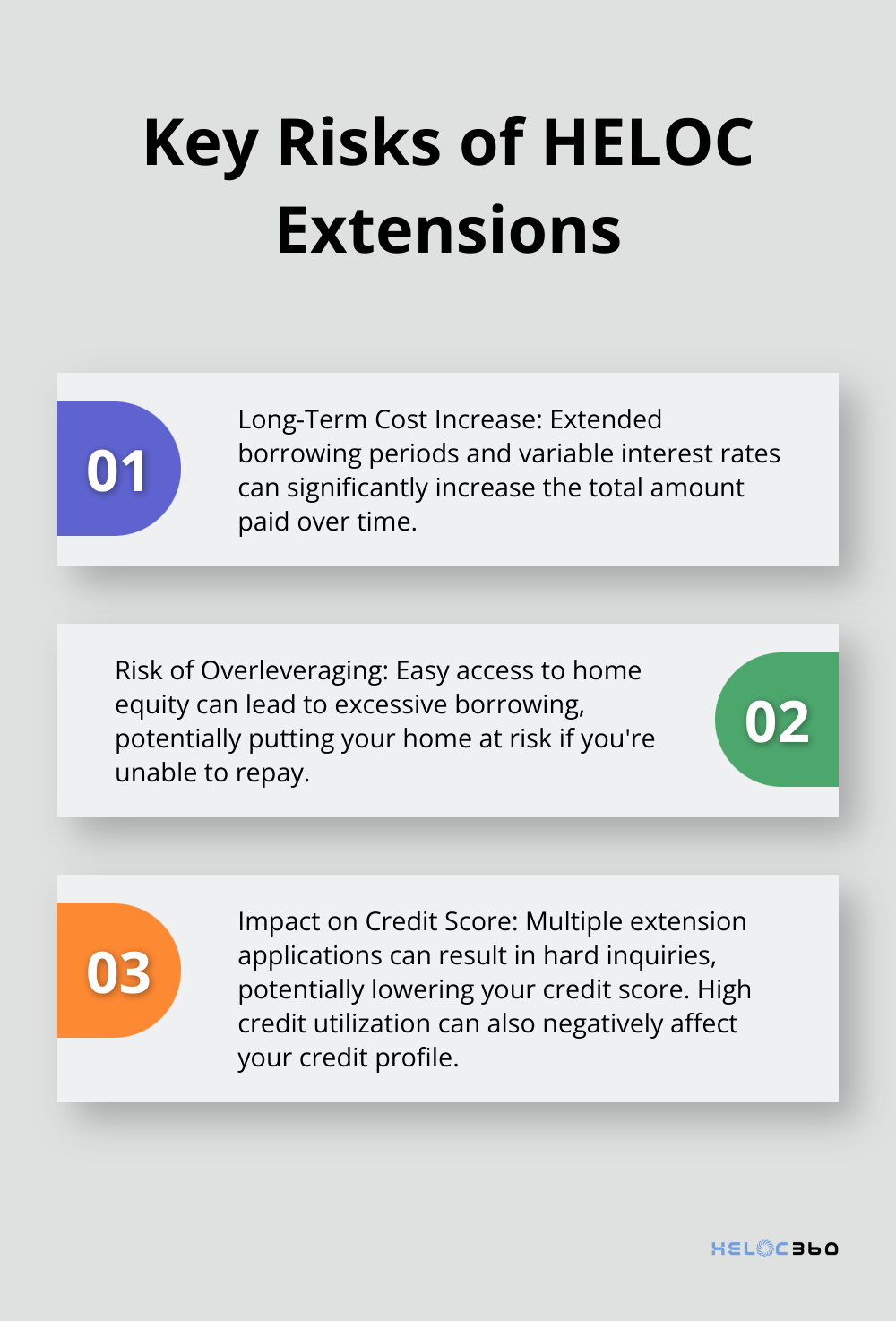Homeowners with a Home Equity Line of Credit (HELOC) often face a decision as their draw period nears its end: Should they consider a HELOC extension?
At HELOC360, we understand this can be a complex choice. A HELOC extension allows you to continue accessing your home equity, but it comes with both benefits and potential drawbacks.
This guide will help you navigate the pros and cons of extending your HELOC, empowering you to make the best decision for your financial future.
What Is a HELOC Extension?
Definition and Basics
A HELOC extension allows homeowners to prolong the draw period of their Home Equity Line of Credit. The draw period is the initial phase of a home equity line of credit (HELOC), during which you can withdraw funds, up to your credit limit. When this period ends, the repayment phase begins, often lasting 10 to 20 years.
Motivations for HELOC Extensions
Homeowners consider extending their HELOC for various reasons:
- Continued Access to Funds: Many need ongoing financial resources for projects or unforeseen expenses.
- Financial Flexibility: The Federal Reserve reports that as of Q1 2025, 42% of HELOC extensions served as financial safety nets, providing readily available credit for emergencies or opportunities.

HELOC Extensions vs. Refinancing
It’s important to distinguish between extending a HELOC and refinancing it:
- Extension: This option prolongs the draw period without altering other loan terms.
- Refinancing: This process creates a new loan with potentially different terms and rates.
HELOC extensions often involve less paperwork and lower fees compared to refinancing.
However, refinancing might prove more beneficial if you want to significantly change your interest rate or loan terms. (It’s always wise to consult with financial experts to determine the best course of action for your specific situation.)
Factors to Consider
When contemplating a HELOC extension, you should review:
- Your current financial situation
- Future financial needs
- Terms offered by your lender
Try to compare offers from multiple lenders to secure the best possible deal. (This step can potentially save you thousands of dollars over the life of your HELOC.)
As you weigh the pros and cons of HELOC extensions, it’s essential to understand their potential impact on your long-term financial health. Let’s explore the advantages of extending your HELOC in the next section.
Why Extend Your HELOC?
Continued Access to Funds
Extending your Home Equity Line of Credit (HELOC) offers several advantages, particularly if you’re not ready to enter the repayment phase. One primary benefit is the ongoing access to funds. This financial flexibility proves invaluable for ongoing projects or unexpected expenses.
Interest Rate Advantages
Market conditions might allow you to secure a lower interest rate when you extend your HELOC. However, it’s important to note that the current interest rate environment and higher Fed funds rate have a direct impact on HELOC rates.
Flexible Repayment Options
Many lenders offer more adaptable repayment terms when extending a HELOC. These options might include interest-only payments for a set period or graduated payment structures.
Simplified Process
Extending your existing HELOC often involves less complexity than applying for a new one. You’ll likely encounter reduced paperwork and lower fees compared to starting from scratch.

While these advantages make HELOC extensions attractive, it’s important to consider potential drawbacks and assess your personal financial situation. The next section will explore some risks and considerations you should keep in mind when contemplating a HELOC extension.
Hidden Pitfalls of HELOC Extensions
The Long-Term Cost of Convenience
Extending your Home Equity Line of Credit (HELOC) isn’t always the financial solution it appears to be. While it provides continued access to funds, homeowners should carefully consider several potential drawbacks.
Extending your HELOC might seem like a quick fix, but it can result in significantly higher interest payments over time. Interest payments for home equity loans and HELOCs are income tax deductible, which reduces the cost of borrowing.
This increased cost stems from two factors:
- You borrow money for a longer period
- HELOC interest rates are typically variable, meaning they can increase over time
Balances on HELOCs increased by $6 billion in the first quarter of 2025, the twelfth straight quarterly increase, according to the latest data.
The Risk of Overleveraging
Another risk of HELOC extensions is the temptation to overleverage your home. It’s easy to view your home equity as an endless source of funds, but this mindset can lead to financial trouble.
Impact on Credit Score
Extending your HELOC can also affect your credit score. Each time you apply for an extension, lenders perform a hard inquiry on your credit report. Multiple inquiries in a short period can lower your score by up to 10 points per inquiry, according to Experian.
Moreover, if you use a high percentage of your available credit line, it can negatively affect your credit utilization ratio, a key factor in credit scoring models.

Market Volatility and Home Value Fluctuations
The housing market’s unpredictability adds another layer of risk to HELOC extensions. If your home’s value decreases, your loan-to-value ratio increases, potentially putting you underwater on your mortgage.
In extreme cases, lenders might reduce your credit limit or freeze your HELOC altogether. (This scenario played out during the 2008 housing crisis and could happen again in future market downturns.)
To mitigate these risks, create a solid repayment plan and avoid using your HELOC for non-essential expenses. Try setting up automatic payments to ensure you consistently pay down your balance.
Before extending your HELOC, take a hard look at your financial situation. If you rely on your HELOC to cover regular expenses, it might be time to reassess your budget and explore other financial options.
Final Thoughts
A HELOC extension requires careful consideration of your financial situation and future goals. You must weigh the benefits of continued fund access against potential risks like increased long-term costs and overleveraging. Your decision should align with your overall financial strategy and account for factors such as income stability, existing debts, and the purpose of the funds.
Professional advice can provide valuable insights if you’re unsure about extending your HELOC. HELOC360 specializes in helping homeowners navigate home equity financing complexities. Our platform offers expert guidance and connects you with lenders that match your specific needs.
The choice to extend your HELOC should support your financial well-being and help you achieve your goals. Market conditions and home values can fluctuate, potentially affecting your loan-to-value ratio and overall financial health. (You should consider these factors carefully before making your decision.)
Our advise is based on experience in the mortgage industry and we are dedicated to helping you achieve your goal of owning a home. We may receive compensation from partner banks when you view mortgage rates listed on our website.
